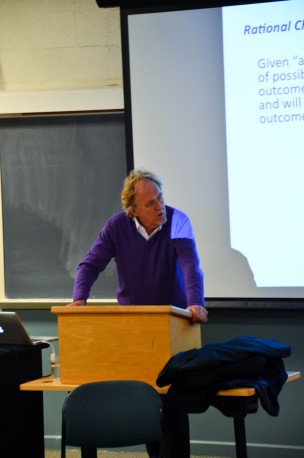On April 9, the Wesleyan International Relations Association and the Adelphic Educational Fund hosted a lecture titled “U.S. Foreign Policy From Bush to Obama.”
On April 9, the Wesleyan International Relations Association and the Adelphic Educational Fund hosted a lecture titled “U.S. Foreign Policy From Bush to Obama.” The discussion concentrated on the differences in foreign policy and decision-making between the Bush and Obama administrations and what we can expect in the future.
The guest speaker was Alex Hybel, the Susan Eckert Lynch ’62 Professor of Government and International Relations at Connecticut College. Hybel’s research and teaching primarily focuses on international relations theory, U.S. foreign policy, U.S. foreign policy decision-making, democracy, and Latin American politics. He has written eight books pertaining to these topics and has won numerous academic awards, including the Nancy Batson Nisbet Rash Faculty Research Award and the John King Teaching Award.
Hybel began his talk by discussing the importance of a leader’s decision-making techniques.
“One of the greatest failures that we have done in this country and across the world is that we never think carefully about how decision-makers approach decision-making problems,” Hybel said. “And you know perfectly well that in a year and a half or so we’re going to have to select between a Democrat and a Republican. And obviously we’re going to hear a whole lot…from them. But the one thing that you will not hear is how do they go about making decisions.”
Solange Resnik ’18 found that the point about elections coming up made the lecture more applicable to the lives of the other student attendees.
“When he brought up how we would all be voting in a year or so, I felt myself start to pay attention more,” Resnik said. “It dawned on me that this topic of decision-making would be a really important aspect of the leadership of whoever is elected. It’s definitely something I will now take into consideration in a more serious way when I vote for the first time in 2016.”
Christina Sickinger ’18 agreed, noting that Hybel made his lecture both interesting and easy to understand.
“I liked how it was really informative, but at the same time it was still comprehensible for me as someone who doesn’t know a lot about foreign policy in the Middle East,” Sickinger said.
One of the main points that Hybel made in his comparisons of foreign policy leaders was the difference between rational and intuitive decision-making.
“Intuitive decisions can be as good as rational decisions,” Hybel said. “But, there is an important distinction to be made here. And that is between the individual who has ample experience in foreign policy and can rely on his or her intuition by going back in history, on their experiences; and the individual who has intuition that has no experience.”
Maile McCann ’18 found this way of thinking to be especially interesting.
“My favorite part was when he was talking about [how] the difference between intuition and reasoned thinking is that with reasoned thinking you have to think of the potential consequences, whereas if you just go off your intuition you don’t really have to think things through,” McCann said. “Just going with your gut means you don’t really consider the consequences…. You just go with what you think the best option would be. A deliberate, reasoned decision requires you to think of the consequences, and thus you’d probably be more cautious.”
Hybel elaborated on this distinction when comparing the Bush and Obama administrations, citing it as one of the main differences between the two presidents.
“George W. Bush and his father were both highly intuitive decision-makers,” Hybel said. “But there is a critical difference. George Bush [Sr.] had ample experience as a foreign policy maker…. He had good reason to rely on his intuition. George W. Bush had no reason to rely on his intuition. But he did that repeatedly. On the other hand, you had someone like Barack Obama, who was equally ignorant on foreign policy… he also lacked experience. The critical difference is that Barack Obama knew he was ignorant. And hence, he spent lots and lots of time analyzing.”
Throughout the lecture, Hybel analyzed the different ways in which Bush and Obama handled issues such as the economy, Afghanistan, and Iraq. In summation, he emphasized just how different they were in handling foreign policy decisions.
“It would be difficult to find two presidents of the modern era who differ more in their approaches to foreign policy decision-making than George W. Bush and Barack Obama,” Hybel said. “One trusted his intuition, the other, his analytical skill. One was patient, the other one, forbearing… In short, one demanded little of his cognitive resources, and the other demanded much. The only thing that Bush and Obama had in common, aside from being president of the United States, is that neither had any experience in foreign policy decision-making.”
